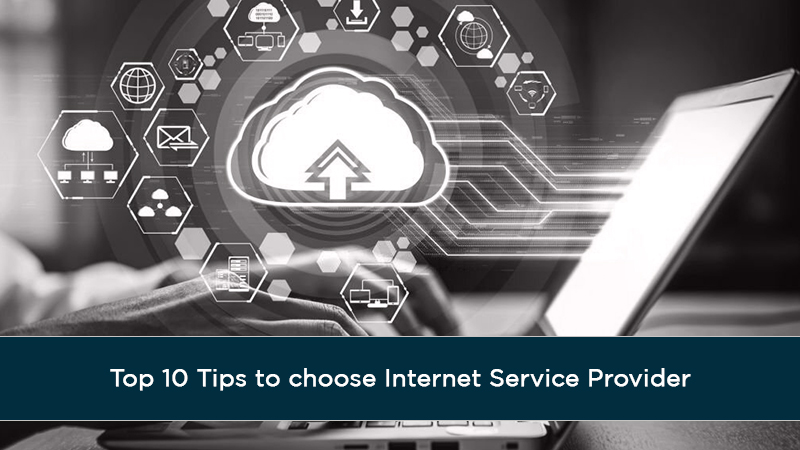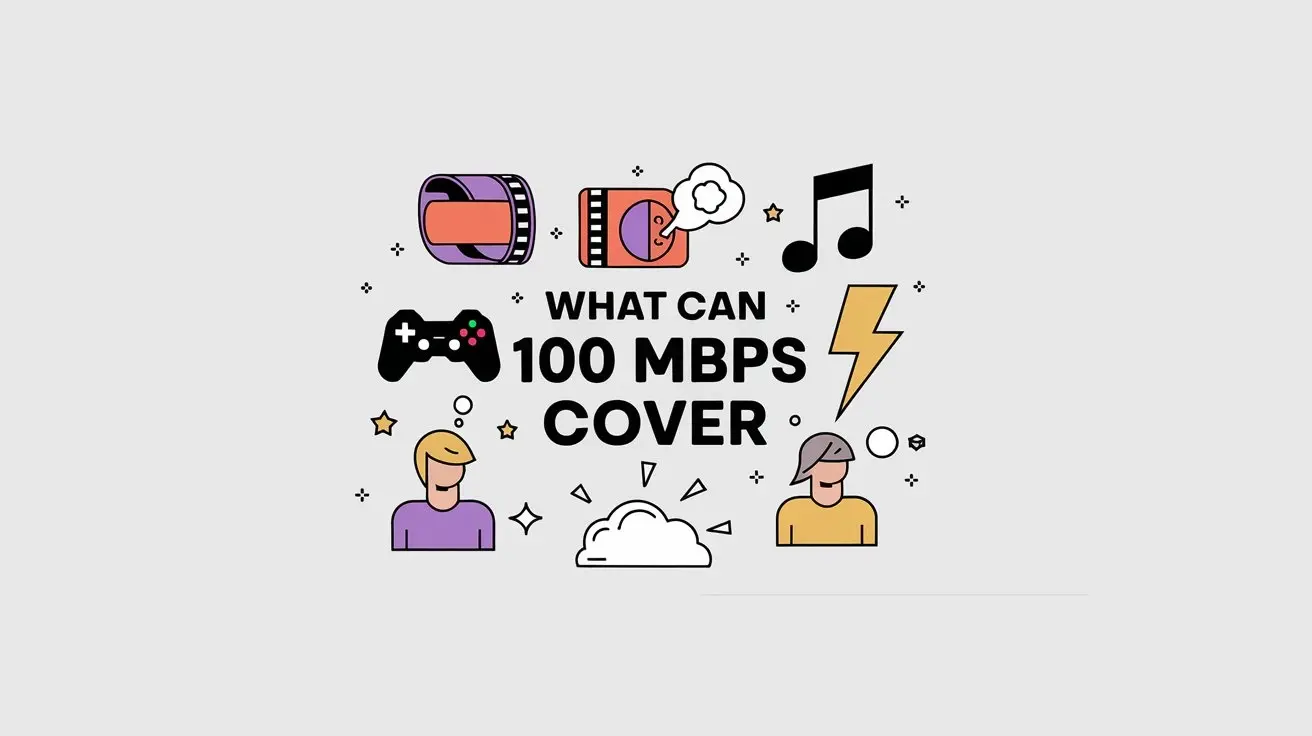
Choosing an internet service provider can be a daunting task with so many options available. To help make the process easier, here are the top 10 tips to consider when selecting an internet provider. By considering these factors, choosing an internet service provider can be a more streamlined and informed decision.
Tips to Choose Internet Service Provider
1. Assess Your Needs and Usage
When choosing an internet service provider, it is important to assess your needs and usage to ensure that you select the best plan and provider for your specific situation. Factors to consider include internet speeds, pricing, availability in your area, and reliability. It is also important to consider the type of connection available, as well as any potential extra fees or incentives offered by the provider. Those living in rural areas may have limited options, but should still seek out the best alternative, whether it be a satellite, DSL fixed wireless, or 4G LTE. It is recommended to do research and read reviews from customers in your area to gauge a provider's reliability and effectiveness. By assessing your needs and usage, you can find fast, reliable internet at a fair price.
2. Research Available Internet Service Providers in Your Area
Researching available internet service providers in your area is essential for anyone who wants to stay connected in a fast-paced world. With the increasing reliance on the internet for communication, entertainment, and work-related tasks, finding a reliable internet service provider becomes crucial. By utilizing resources such as online databases and customer reviews, one can easily compare and contrast the different internet packages and pricing options offered by various providers in their area. Additionally, the speed and quality of the connection should also be taken into consideration, as it can greatly impact the user's online experience. Once the options have been narrowed down, it is important to contact the chosen provider directly for further information and to ensure that the service is available at the user's desired location. Overall, investing time and effort into researching available internet service providers in your area can pay off in the long run by providing a satisfactory and efficient online experience.
3. Evaluate Internet Speed Options
Choosing the right internet service provider (ISP) is crucial in attaining reliable and high-speed internet connectivity. Consumers have a variety of options when it comes to selecting an ISP, and they must evaluate their internet speed options before making a decision. One must start by determining which providers offer service in their area. By using a zip code tool, consumers can quickly generate a list of internet providers operating in their region and compare the internet speeds and prices they offer. In selecting an ISP, connection type, speed, and price are the most crucial factors to take into account. It's also essential to be aware of any additional costs, such as installation fees and data overages, that may impact one's monthly bill. By utilizing internet speed tests, consumers can evaluate their current internet performance and decide if they need to upgrade their speed options. In rural areas, satellite internet is the most straightforward option to get, but consumers must ensure they get the most out of their plan by knowing their internet speed options and limitations' data caps. In summary, selecting the right ISP and internet speed options are crucial for any online activity, whether for personal or business use.
4. Consider Data Caps and Usage Policies
When considering an internet service provider, it is important to take into account their data caps and usage policies. Data caps are limits on the amount of data that can be used during a billing cycle, and they can vary significantly among providers. Some providers offer plans with unlimited data, while others have hard or soft data caps that can result in additional fees or reduced speeds. Additionally, usage policies may vary among providers and can impact the quality of service for heavy users, such as gamers or those who frequently stream HD movies. To make an informed decision about the best provider for your needs, it is important to research their data caps and usage policies, as well as any additional fees or options for increasing data allowances.
5. Compare Pricing and Plans
The primary criteria that most people look at are speed and price, but there are also other factors to consider, such as installation and equipment costs, customer service quality, and data caps. One useful tool for comparing providers is to use an online comparison service, such as Ctvforme or CablePapa, which can help you quickly and easily compare pricing and plans across multiple providers. It is also important to consider your specific needs when choosing a provider, such as the number of connected devices in your home or business and whether you require additional services like a phone or TV. By taking the time to carefully consider all of these factors, you can choose an internet service provider that meets your needs and provides you with reliable, high-speed internet access at an affordable price.
6. Check for Reliability and Service Quality
Choosing the right internet service provider is crucial for getting fast and reliable internet service. When selecting an ISP, it is essential to check for reliability and service quality. One way to do this is by reading online reviews from customers in your area to gauge their experience with that provider. It's also important to consider the type of internet connection you have and other outside factors such as adverse weather conditions that may affect your internet connection.
7. Customer Support and Technical Assistance
Choosing the right Internet service provider (ISP) for customer support and technical assistance is crucial for a smooth and stress-free online experience. According to multiple surveys and national reviews, EarthLink, AT&T, and Verizon are consistently ranked among the top three ISPs for their exceptional customer service and support. EarthLink, in particular, has been ranked first in terms of price, speed, reliability, and customer service/support for two years in a row. Meanwhile, AT&T and Verizon have also scored highly across all categories, with AT&T even gaining the top place in the West South and North Central areas in the J.D. Power 2023 Residential Internet Service Provider Satisfaction Study. When choosing an ISP, it's important to consider factors such as pricing transparency, unlimited data, and Internet speeds, as well as local reviews and customer feedback. Ultimately, the commitment of an ISP to provide reliable support and technical assistance can make all the difference for a positive online experience.
8. Equipment and Installation
When choosing an internet service provider, it's important to consider the equipment and installation options that they offer. Some ISPs offer equipment rental, including modems and routers, while others require you to purchase your own equipment. It's important to do your research and determine which option is best for you and your budget. Additionally, you'll want to consider the installation process and whether or not the provider offers professional installation services. Professional installation can ensure that your equipment is set up properly and that your internet connection is functioning at full capacity. Be sure to ask about installation fees and whether they are included in your service plan or if they are an additional cost. By considering these factors, you can ensure that you are selecting an ISP that provides reliable equipment and installation services to meet your internet needs.
9. Additional Features and Value-added Services
One important factor to consider when choosing an internet service provider is the additional features and value-added services they offer. Many ISPs provide extras like free streaming services, VISA gift cards, and discounts on other services. These added bonuses can provide extra value to the customer and ultimately save them money. ISPs may also offer security features like antivirus software, identity theft protection, and parental controls. These features can give customers peace of mind when using the internet. Additionally, some ISPs may offer customer service benefits like 24/7 support, online bill pay options, and easy account management tools. These value-added services can make a big difference in the overall customer experience and should be considered when comparing ISPs. By looking beyond just the basic internet services, customers can find an ISP that not only provides reliable internet but also offers additional benefits that enhance their online experience and provide added value.
10. Seek Recommendations and Ask for Referrals
When choosing an internet service provider, seeking recommendations and referrals can greatly aid in making an informed decision. The process of finding an ISP can be overwhelming, especially with the abundance of options available. To streamline the search, it is advisable to seek input from friends, family, and colleagues who have firsthand experience with different providers. Social media platforms and online community forums can also serve as useful resources for seeking recommendations. When asking for referrals, it is important to clearly communicate what specific features or services are being sought. This makes it easier for the referral source to provide relevant and accurate information. Additionally, a polite and professional tone should be maintained throughout the communication to ensure that relationships are maintained. Ultimately, the goal of seeking recommendations and referrals is to identify the best ISP that can provide reliable and cost-effective services.
Call on (855) 210-8090 & choose the best internet service provider now!
Resources:
Which ISP is Right for You and Your Household?





